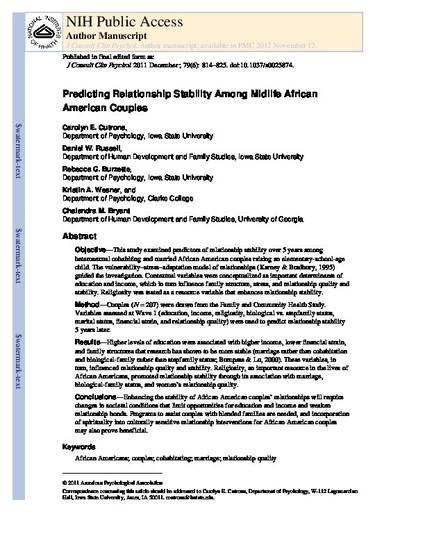
Article
Predicting relationship stability among midlife African American couples
Journal of Consulting and Clinical Psychology
Document Type
Article
Disciplines
Publication Date
12-1-2011
DOI
10.1037/a0025874
Abstract
Objective: This study examined predictors of relationship stability over 5 years among heterosexual cohabiting and married African American couples raising an elementary-school-age child. The vulnerability–stress–adaptation model of relationships (Karney & Bradbury, 1995) guided the investigation. Contextual variables were conceptualized as important determinants of education and income, which in turn influence family structure, stress, and relationship quality and stability. Religiosity was tested as a resource variable that enhances relationship stability. Method: Couples (N = 207) were drawn from the Family and Community Health Study. Variables assessed at Wave 1 (education, income, religiosity, biological vs. stepfamily status, marital status, financial strain, and relationship quality) were used to predict relationship stability 5 years later. Results: Higher levels of education were associated with higher income, lower financial strain, and family structures that research has shown to be more stable (marriage rather than cohabitation and biological-family rather than stepfamily status; Bumpass & Lu, 2000). These variables, in turn, influenced relationship quality and stability. Religiosity, an important resource in the lives of African Americans, promoted relationship stability through its association with marriage, biological-family status, and women's relationship quality. Conclusions: Enhancing the stability of African American couples' relationships will require changes in societal conditions that limit opportunities for education and income and weaken relationship bonds. Programs to assist couples with blended families are needed, and incorporation of spirituality into culturally sensitive relationship interventions for African American couples may also prove beneficial
Copyright Owner
American Psychological Association
Copyright Date
2011
Language
en
File Format
application/pdf
Citation Information
Carolyn E. Cutrona, Daniel W. Russell, Rebecca G. Burzette, Kristin A. Wesner, et al.. "Predicting relationship stability among midlife African American couples" Journal of Consulting and Clinical Psychology Vol. 79 Iss. 6 (2011) p. 814 - 825 Available at: http://works.bepress.com/carolyn_cutrona/2/

This is an author's manuscript of an article from Journal of Consulting and Clniical Psychology 79 (2011): 814–825, doi:10.1037/a0025874. This article may not exactly replicate the final version published in the APA journal. It is not the copy of record.